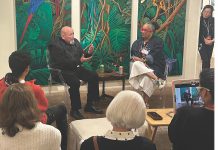WATSONVILLE — For years, former Pajaronian editor Mike Wallace has been fascinated by wrongful conviction cases and has been compiling news stories on them. Now he’s put that interest to work in his fifth mystery novel, a wrongful-conviction story titled “I Scarce Can Die.”
“It probably goes back to the TV series ‘The Fugitive,’ of which I was a big fan,” Wallace said. “I find it really interesting how police and prosecutors can convince themselves of the guilt of an innocent person and persuade a jury as well. It says a lot about the limits to our ability to know and understand.”
Wallace will be signing copies of his book Saturday from 1-3 p.m. at Kelly’s Books, 1838 Main St., in the Watsonville Square shopping center.
The latest book sends Wallace’s protagonist, Quill Gordon, to an old Gold Rush town in the California foothills to look into a recent murder case where a man was convicted of killing his wife in an alcoholic blackout. The case seemed open-and-shut, and the jury returned a guilty verdict in 45 minutes, but Gordon quickly suspects there was more to the story.
Paralleling Gordon’s investigation into the recent case, a historian is in town, convinced that an innocent person was hanged in one of the celebrated murder cases of the Gold Rush days and looking to prove it. The modern and historical investigations dovetail with each other to the end of the book.
“This isn’t a legal thriller about the technicalities of overturning a conviction,” Wallace said. “It’s about how the prejudices and intrigues of a small town can distort people’s views of evidence and how an outsider with a fresh eye can peel away the layers of the onion and get at the truth. The two cases, occurring a century and a half apart, illustrate that in different ways.”
To prepare for writing the book, Wallace did a lengthy interview with one of the top officials of the Northern California Innocence Project, a legal advocacy organization that works to exonerate people wrongfully convicted of crimes.
“There are a number of factors that keep coming up in wrongful convictions,” Wallace said. “These include bad eyewitness testimony, incompetent forensic evidence, incompetent or inexperienced defense attorneys, suppression of exculpatory evidence, and false confessions. Interestingly, in 15 to 20 percent of convictions overturned through DNA evidence, the person exonerated had confessed to a crime he or she didn’t commit.
“The good news is that wrongful convictions are, thankfully, rare, and ones involving outright police misconduct are rarer yet. But they can and do happen, and this book is an attempt to illustrate how, within the structure of an entertaining mystery novel.”









